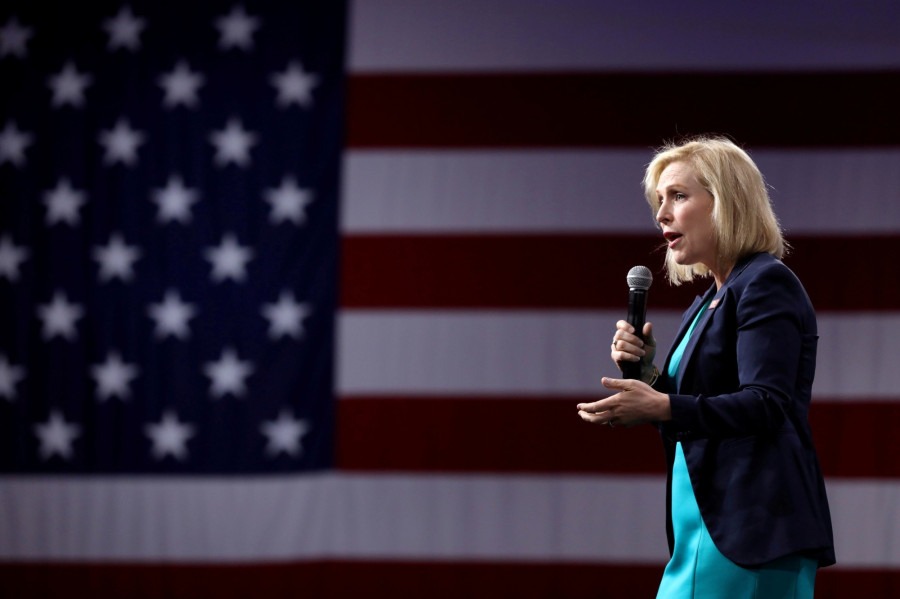National
Bipartisan Congress delegation from US to arrive on April 23
Senator Kirsten Gillibrand to lead the team to Kathmandu. The team from Washington is arriving on the heels of MCC Compact’s passage, which Beijing has objected to.
Anil Giri
The United States is set to send a bipartisan Congressional delegation to Kathmandu on April 23, multiple sources have confirmed.
The Post had reported on March 17 that the US was sending a Congressional delegation in April.
Diplomatic sources told the Post that Senator Kirsten Gillibrand is leading the US delegation to Nepal and both Kathmandu and Washington are making necessary arrangements for the visit.
Nepali officials confirmed that the delegation, arguably the biggest to date from Washington, comprises 25 members, some parliamentarians, and State Department officials, among others.
Observers say the visit is crucial given a fast-changing world order, with Nepal under the spotlight in recent weeks for multiple reasons, including the passage of the Millennium Challenge Corporation compact by the lower house, Beijing’s concerns over the US grant, a visit by Chinese Foreign Minister Wang Yi and Prime Minister Sher Bahadur Deuba’s trip to India.
In the lead up to the ratification of the MCC compact, a $500 million grant from the United States for improving electricity supply and roads, Washington’s pressure on the Nepali leadership had become apparent, just while Beijing warned the US against “coercive diplomacy”.
The visit by the US parliamentary delegation holds much significance, said Arjun Karki, former Nepali Ambassador to the United States. “The bipartisan parliamentary delegation is powerful and it holds clout back in Washington DC.”
Gillibrand, who will be leading the US delegation, represents New York from the Democratic Party.
She was elected to the US Senate in 2010. She is also a lawyer.
As per her website, she has been advocating several reforms on social issues in the US Senate. Her top priorities as a senator include creating more well-paying jobs to rebuild the middle class, increasing access to good, affordable healthcare and improving educational opportunities from pre-kindergarten to college or vocational training, according to her personal website.
Though the visit by the US parliamentary delegation is still two weeks away, officials in Nepal have already started working on the possible agendas to be discussed.
“As of now, we are just working out on meetings and probable agendas,” said a government official. “The US delegation is expected to hold talks with political leaders as well.”
Amid fast-changing geopolitical scenarios, Nepal finds itself caught in the game of big power countries where India and China, the two immediate neighbours, have their own rivalry while Washington and Beijing have their own trade war to deal with.
Historically, Delhi, Beijing and Washington have been Kathmandu’s good friends.
Given the backdrop of the passage of the MCC Nepal Compact after years of controversy, Beijing’s increased concerns over the US grant and Wang’s visit to Kathmandu, it is apparent that powerful countries have renewed their interest in Nepal, according to officials and experts.
Washington’s plan to send the 25-member delegation, on the heels of the high-profile visit from Beijing, many say, comes as an indication that the US wants to convey reassurances to Nepal.
“The visit of the US parliamentarians has at least two contexts,” another official said. “They are coming to congratulate Nepal for the parliamentary ratification of the MCC compact and to prepare ground for a possible high-level visit from the US whenever possible after local elections.”
Nepal is holding local elections on May 13.
The visit of the US Congress delegation will also lay the ground for more high-level exchanges later this year from both sides to mark 75 years of the establishment of diplomatic ties between Nepal and the US, according to government sources.
“This year marks the 75th anniversary of the Nepal-US diplomatic ties and a lot of political and social engagements are taking place between the two countries,” the official, who spoke on the condition of anonymity, told the Post.
“The US has also extended an invitation to Prime Minister Deuba to visit Washington. There are also talks about inviting either US Vice President Kamala Harris or US Secretary of State Antony Blinken to Kathmandu this year as part of the celebrations of the 75 years of establishment of Nepal-US ties.”
Karki, the former ambassador, said the visit may look like a regular one in the context of celebrations of Nepal-US ties but “it does hold a political meaning.”
“They raise issues and discuss agendas on behalf of the government. We need to understand the political significance of such visits,” Karki told the Post.
A source familiar with the development said the 25-member US bipartisan delegation will have members of the US congressional committees—foreign affairs and judiciary, energy and commerce, human rights and finance, among others—as well as a senior State Department official.
The last time a big team from the US had arrived in Nepal was in 2017, when the US House of Representatives Democratic leader Nancy Pelosi led an eight-member bipartisan Congressional delegation to Kathmandu. Later in February 2020, Representative Ami Bera, who chaired the House Foreign Affairs Committee’s (HFAC) Subcommittee on Asia, the Pacific and Nonproliferation, led a four-member bipartisan Congressional Delegation to Kathmandu.




 10.12°C Kathmandu
10.12°C Kathmandu















